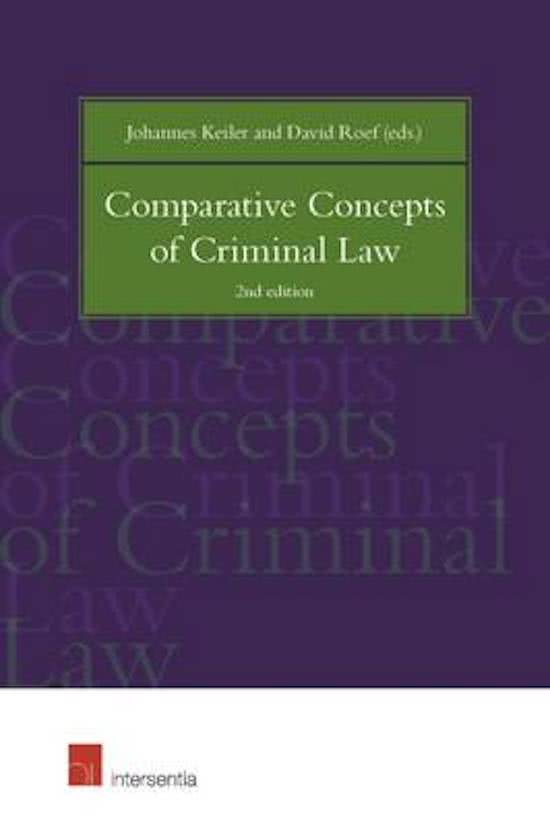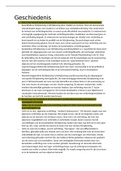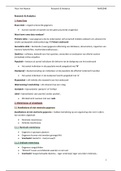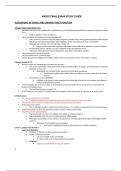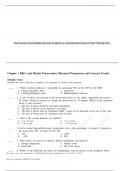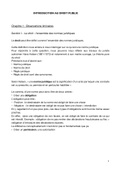Substantive Criminal Law
Week 4:
Chapter 7: Justifications and Excuses
Criminal law provides certain circumstances (defences) that take away the criminal liability of
the perpetrator. We distinguish between justifications and excuses.
The dichotomy makes a fundamental distinction between wrongfulness and
blameworthiness, between act and actor, between an objective evaluation of all things
considered and subjective reasons for acting.
There is a wide range of justifications and excuses than can be put forward by the defendant.
Here, the justifications discussed are self-defence and necessity, and the excuses of self-
defence excess and duress, and the excuse of insanity.
Rationale of the dichotomy:
Communicative difference:
A justification negates the wrongfulness of the act, while an excuse negates the
blameworthiness of the actor. A distinction can be made between acquitting a defendant who
did not commit the crime at all, and acquitting a defendant who committed the crime but was
justified in doing so, e.g. due to self-defence.
Wrongfulness constitutes the law’s socio-ethical condemnation of the act, whereas
blameworthiness constitutes a social-ethical reprimand against the actor.
Example: the communicative advantage of the dichotomy becomes more clear when we look
at R v Dudley and Stephens where the excuse of duress was rejected because the court
feared the public would misunderstand their acquittal as a justification of their actions.
Personal and universal application:
Justifications are believed to have a universal character, whereas excuses operate only
personally. This means that if someone is justified, a 3rd party may assist that person,
whereas if that someone is merely excused, a 3rd party may not intervene.
The universal application of justifications is often based on the perspective that justified
conduct is said to produce a net social benefit and therefore constitutes no wrong.
Participation is only possible in a wrongful act, so a justification applies to all participants.
Self-defence:
- Defending oneself can be seen as a natural right (dominant until 19th century).
- In Anglo-American law a classic and very common rationale concentrates on the
culpability of the aggressor.
- Self-defence is only allowed when necessary and proportional.
- Art. 41 DCC and §32 GCC on self-defence.
- In order for self-defence to justify a criminal offence, the attack must be wrongful,
imminent and infringe an individual interest. The individual is only allowed to use the
least intrusive means of defence (subsidiarity requirement) and the defendant must
act in line with the requirements of proportionality.
- The choice of defensive means is often closely connected with the subsequent
question of proportionality of how one could use these least intrusive means.
- English law: Section 76 of the Criminal Justice and Immigration Act 2008 on self-
defence.
- Only a wrongful attack can give rise to self-defence. Attacks of an animal only qualify
under self-defence if a human has incited it.
- Self-defence if a fight of right against wrong, the attack must be wrongful or unlawful.
It only applies against attacks that are imminent, have begun or are ongoing.
- The right to self-defence ends with the end of the attack. The attack is ongoing until
the aggression has been factually completed either by abandoning the attempt, by its
Week 4:
Chapter 7: Justifications and Excuses
Criminal law provides certain circumstances (defences) that take away the criminal liability of
the perpetrator. We distinguish between justifications and excuses.
The dichotomy makes a fundamental distinction between wrongfulness and
blameworthiness, between act and actor, between an objective evaluation of all things
considered and subjective reasons for acting.
There is a wide range of justifications and excuses than can be put forward by the defendant.
Here, the justifications discussed are self-defence and necessity, and the excuses of self-
defence excess and duress, and the excuse of insanity.
Rationale of the dichotomy:
Communicative difference:
A justification negates the wrongfulness of the act, while an excuse negates the
blameworthiness of the actor. A distinction can be made between acquitting a defendant who
did not commit the crime at all, and acquitting a defendant who committed the crime but was
justified in doing so, e.g. due to self-defence.
Wrongfulness constitutes the law’s socio-ethical condemnation of the act, whereas
blameworthiness constitutes a social-ethical reprimand against the actor.
Example: the communicative advantage of the dichotomy becomes more clear when we look
at R v Dudley and Stephens where the excuse of duress was rejected because the court
feared the public would misunderstand their acquittal as a justification of their actions.
Personal and universal application:
Justifications are believed to have a universal character, whereas excuses operate only
personally. This means that if someone is justified, a 3rd party may assist that person,
whereas if that someone is merely excused, a 3rd party may not intervene.
The universal application of justifications is often based on the perspective that justified
conduct is said to produce a net social benefit and therefore constitutes no wrong.
Participation is only possible in a wrongful act, so a justification applies to all participants.
Self-defence:
- Defending oneself can be seen as a natural right (dominant until 19th century).
- In Anglo-American law a classic and very common rationale concentrates on the
culpability of the aggressor.
- Self-defence is only allowed when necessary and proportional.
- Art. 41 DCC and §32 GCC on self-defence.
- In order for self-defence to justify a criminal offence, the attack must be wrongful,
imminent and infringe an individual interest. The individual is only allowed to use the
least intrusive means of defence (subsidiarity requirement) and the defendant must
act in line with the requirements of proportionality.
- The choice of defensive means is often closely connected with the subsequent
question of proportionality of how one could use these least intrusive means.
- English law: Section 76 of the Criminal Justice and Immigration Act 2008 on self-
defence.
- Only a wrongful attack can give rise to self-defence. Attacks of an animal only qualify
under self-defence if a human has incited it.
- Self-defence if a fight of right against wrong, the attack must be wrongful or unlawful.
It only applies against attacks that are imminent, have begun or are ongoing.
- The right to self-defence ends with the end of the attack. The attack is ongoing until
the aggression has been factually completed either by abandoning the attempt, by its

